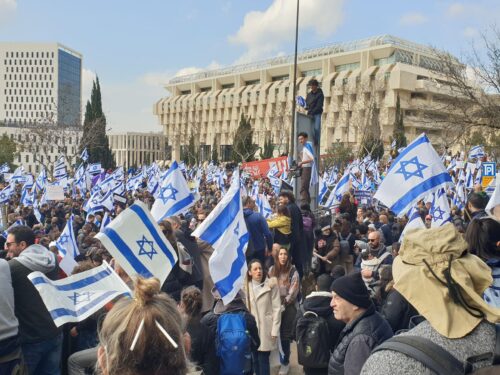Generations after the Yom Kippur War, the events of October 7, 2023 and the Iron Swords war have placed the IDF’s reserve forces in the center of national consensus. This time, the Y generation, perceived mostly as an age group that places “me” before “us” – socially placing the individual before the collective – proves that in times of trouble, the national ethos trumps all, personal considerations of daily life included.
The past decade saw a change in the scale of the IDF reserve forces, with significant cuts in the number of reserve units and in the duration of service required from the reservists. After the legislation of the new reserve’s law in 2008, which shrunk the size of the reserves force and scope of training hours, as well as the minimization of the allotment of reserve soldiers for operational activity, claims emerged indicating a general decline of the IDF reserves array.[1] The IDF invested expansive resources, such as financial incentives, in the preservations of those reserve units that remained, and maintain the motivation to enlist for reserves duty; however, already in 2022, falloffs were being recorded in the numbers of reservists reporting for training and active duty[2].
The reservists came into an even starker spotlight during the months of the political protests, since the beginning of 2023, which bred a protest among some reservists and included even the refusal of some to continue to volunteer for duty, some putting their names on a formal reservists’ protest letter and some even choosing not to report for duty. The impression emerging was that this affected the general motivation to serve in reserve duty thereby compromised the IDF’s emergency preparedness.
The surge of the reservists
And yet immediately with the outbreak of the Hamas’ attack in the western Negev, the reservists sprang en mass to action, with hundreds of thousands reporting to their units or making their way directly to the clash points with the terrorists within just hours. This was a record response on a national scale, testimony to which were the roads across the country that were full of reservists making their way by private cars, volunteer transporters, busses; tanks and personnel carriers, and by air in personnel carrying helicopters and commercial flights – all harnessed to mobilize the troops, and was a scene not seen in Israel in generations. In fact, the reservists reporting for duty exceeded 100 precent, and in certain cases hitting 200%, when many of those reporting were not summoned but reported nevertheless, and others, former reservists who no longer are obligated to serve, chose to return to active duty. This response, within a few hours, quicker than anticipated, played a crucial role in the IDF defense deployment, and served as reinforcement and as a holding force in the fighting on the southern border, which was breached by 3000 Hamas terrorists and murderers, and in addition, allowed the army to deploy reinforcement to the northern border of Israel, where they are playing a part in preventing further escalation with Hezbollah on the Lebanon-Israel border fence.
Within 48 hours from the outbreak of the heinous October 7 attack, Israel’s security reality underwent a tectonic change – beyond the huge order of battle that deployed to the south, additional forces were deployed to Judea and Samaria, the Jordan Vally and the northern border with Lebanon. The massive participation of the reservists allowed the IDF to concentrate its efforts in the Gaza arena which was designated as the central arena, with the assurance of a “protective belt” in all of the other volatile arenas.
This response, that will surely be studied when the time comes, is testimony to a fact of the utmost importance for Israel’s national security and the IDF – the ability to mobilize hundreds of thousands of troops to the front line, within 24 hours, constitutes exceptional operational competence, which demonstrates the sense of vitalness prevalent in Israel’s the public, alongside its spirit of volunteering and sacrifice. Until October 6, there were many who doubted that there were still reservists who are willing to drop everything, leave their families and workplace (especially when the homeland is under rocket fire) –even those of the Y generation – and report for duty when the bells of duty toll.
Motivation characteristic to Israeli society
It is important to note that in light of surveys and research exploring the motivation to report for reserve service, especially from the perspective of the reservists themselves– the massive response should come as no surprise. A study conducted in the last decade on the levels of motivation to serve in reserves found a high level of awareness to the gamut of security threats among reservists alongside a strong motivation to serve – despite the internal social shifts and controversy in Israel[3]. Another recent study shows that the so-called reservists mutiny and the unilateral cessation from reserve duty, as a result of the protest of the past months, had no discernable effect on the core group of reservists, most likely because the group of protesters among them were those who are close or past the age of exemption. Nonetheless, the social rifts that arose challenged the perception of the importance of the reserves service, and raised concerns regarding possible contagion, impacting the motivation of other reservists to report for duty in times of emergency[4].
The reserve force comprises 70 percent of the IDF order of battle. In other words, without its reserve’s force, the Israeli army cannot win a war – it just might be that the reservists protest allowed this understanding among our enemies; The headlines in the news did little to contradict this, when already in last August, the news was full of reports regarding systems’ crash the likes of that infamous story aired by TV’s Channel 12, announcing that “we have no air force” [5] may very well have given our enemies confirmation of the opportunity to strike Israel.
Regardless, the reserve system stepped up to the plate in its entirely, and as of now, has been serving for over 50 days – a timeframe that almost exceeds the three-year quota of reserve’s service, and just a little less than that of an officer. The October 7 event, for which over 300 thousand were enlisted, according to the IDF, is unprecedented and evokes the “ebb” of the “armed nation” described by the researcher Brigadier General (res.) Dov Tamari in the beginning of the previous decade[6]. But in fact, no such decline occurred. Au contraire – the reserve force rose to the occasion, and threw itself, lock, stock and barrel into the fray. An afterthought on this matter is that perhaps this is testimony to the moral compass still prevalent in the hearts of the Israelis, and a counter argument to the premature claims of the demise of the IDF reserve’s force.
Beyond the reinforcement of the operative capabilities that the hundreds of thousands of reservists provide the army, it is important to understand the magnitude of the drama that unfolded in Israel – a huge number of Israeli families is forced to take part in the present war as almost every family in Israel had at least one member who is presently in uniforms. This is an unprecedented event on a social-historic scale that will undoubtedly resound for years to come, since the demographic reality of so many families, whose members enlisted to the current fighting is a watershed moment in social accountability of the first order[7] in the civilian backbone of Israel’s society – a phenomenon which is virtually nonexistent in the free world, and very rare globally.
The challenge: long-term resilience and rehabilitation of the routine reserve force
With that said, Israel and the IDF’s current mission is to provide long-term resilience. It must be mentioned that the recruitment of large reserve’s forces comes at the expense of another crucial pillar of Israel’s national security – its economic robustness. The longer the massive reserve’s force remains in service – the larger the harm to the economy. Thus, it behooves the IDF to put in place an apparatus to facilitate long-term enlistment, such as the replenishing and circulation of units – this is a mission on a national level. In this context, it is clear now why the cutbacks in the reserve forces, the likes of which we have seen throughout the years, have become in light of the new reality in Israel an impossibility. On the contrary – there is in fact an imperative to boost the numbers of the reserves’ forces and even extend the duration of regular military service. The State of Israel is at the epicenter of a hostile and violent geopolitical environment, and it cannot allow itself to relax the level of military preparedness and mobilization capabilities of the public. It is quite plausible that once the present conflict is concluded, we shall be seeing radical changes in the military service system, and the reserve’s system in particular.
What boggles the mind is that the same insights and understandings were reached in the wake of Operation Defensive Shield in 2002 and before that – after the Second Lebanon War – two instances that proved beyond doubt the importance of an effective reserves force. Sadly, this understanding was dimmed by the consecutive IDF multi-year plans (תר”ש), in which the reserve’s force was downsized due to the moderate “threat of reference”[8] in a supposedly calculated risk that had eventually proved to be a dangerous gamble that failed. Anyone who knows anything about forming combat units knows that shutting down units is a fast affair that saves little funds, while reforming a unit is a big and costly challenge. The understanding of the demands of present reality must resound loud and clear – reserve units must not be shut down. Streamlining is a positive endeavor, as can be repurposing a unit, however, shutting down or scaling down ground units is a fundamental mistake in the volatile nature of the region. No intelligence effort can predict what might happen in ten or fifteen years.
On a positive note – Israel’s population amounts to roughly 10 million people, which offers the IDF the opportunity to better utilize the civilian resource to boost the enterprise of Israel’s security, among others through reserve service.






